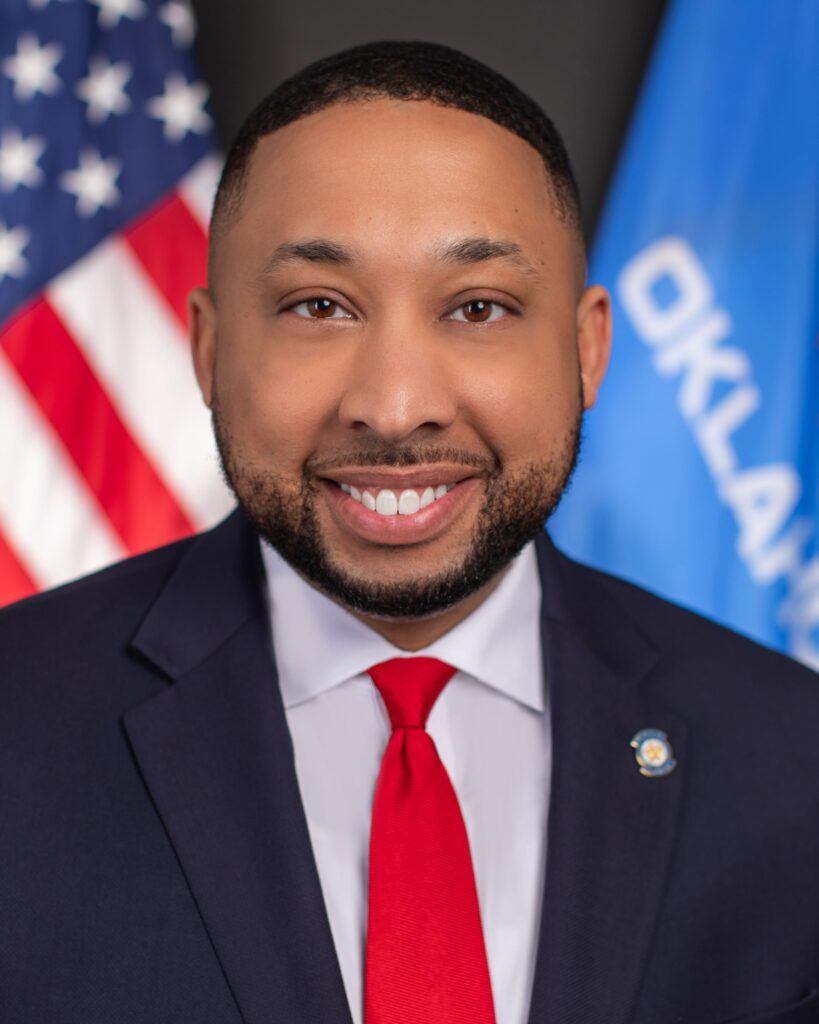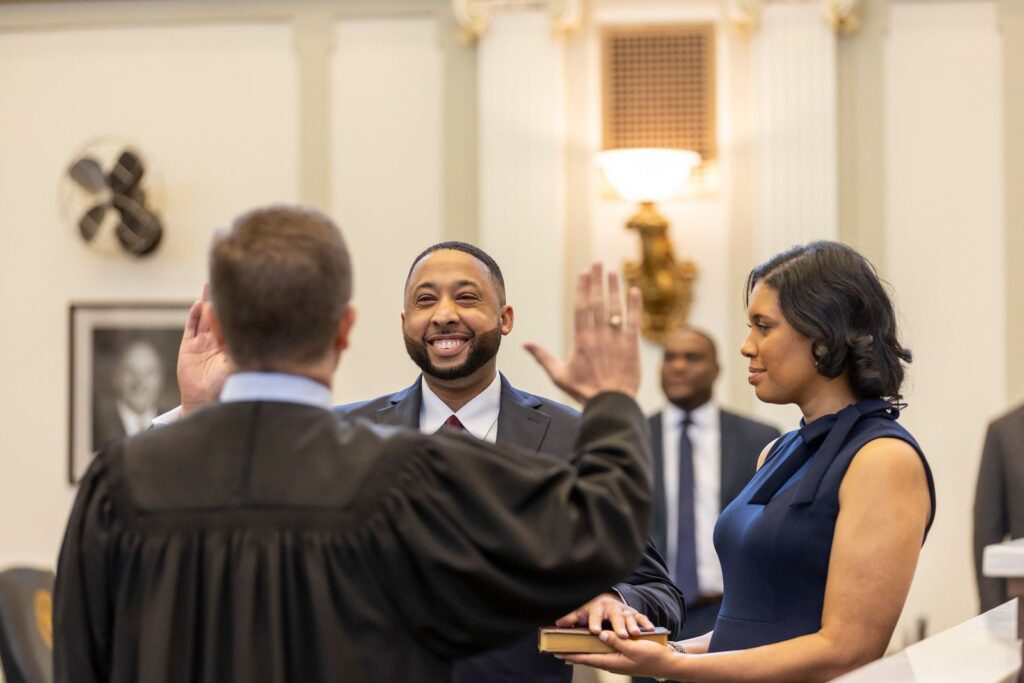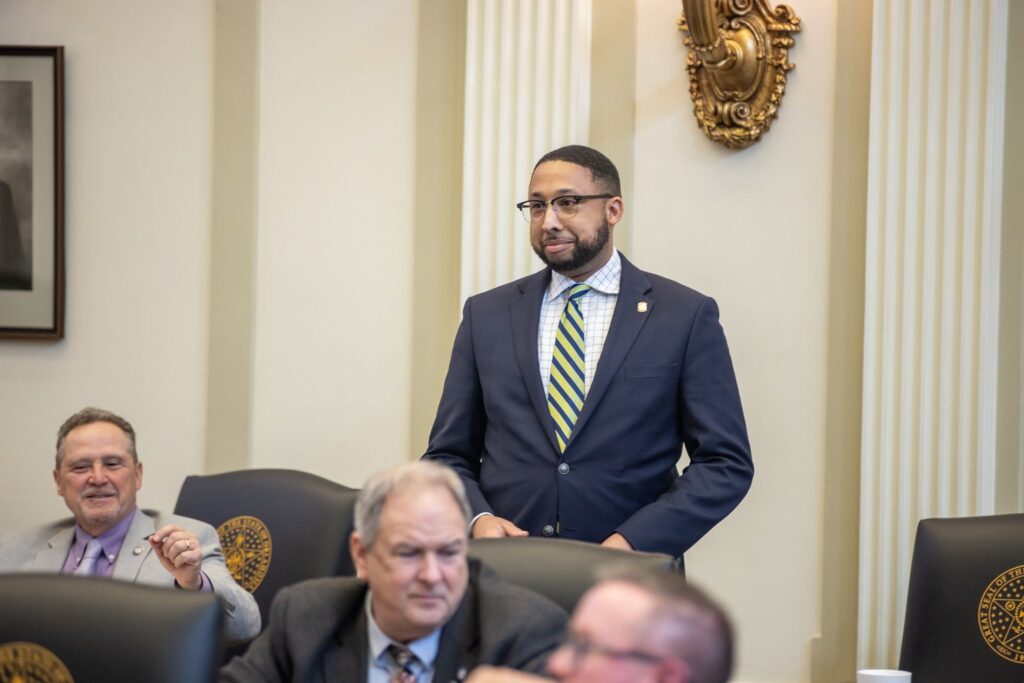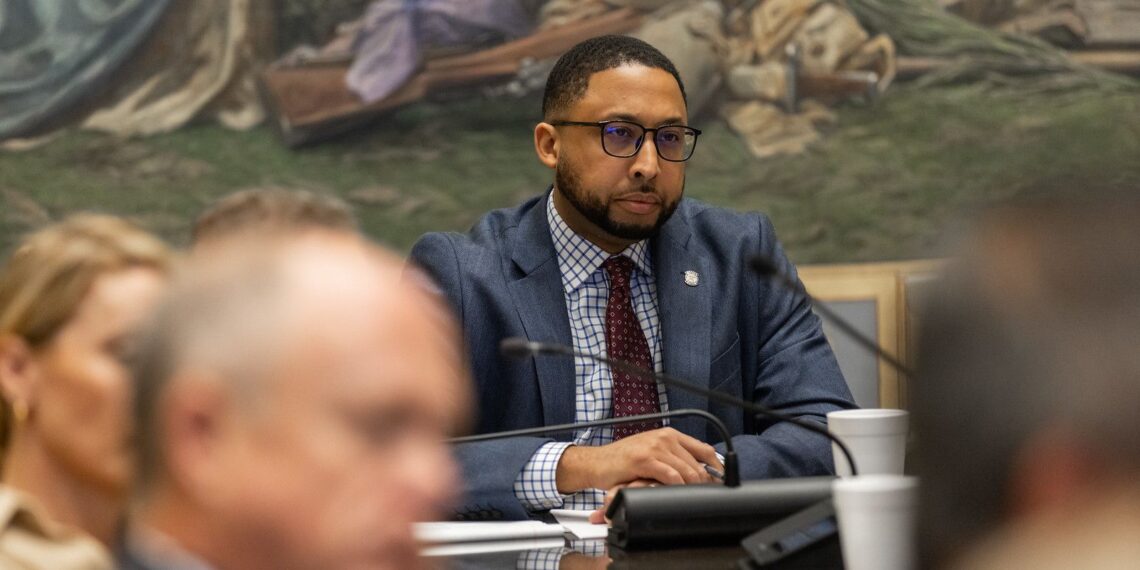OKLAHOMA CITY (OBV) – State Rep. Erick Harris is fighting to expose foreign adversaries who he says are funding lawsuits to hurt companies in Oklahoma and across the U.S.

Harris, R-Edmond, was elected to represent House District 39 in 2024. He’s already making big strides at the State Capitol. House Speaker Kyle Hilbert appointed Harris to serve as the House of Representatives’ Assistant Majority Whip. He also appointed Harris to serve as Vice-Chair of the Appropriations & Budget Judiciary Subcommittee and the Judiciary and Public Oversight Criminal Judiciary Subcommittee. Harris is also a member of the Presiding Officer Team for the 60th Oklahoma Legislature.
A legal expert, Harris was an Assistant Attorney General for the Oklahoma Attorney General’s Office. He now has a private practice and is Vice President for Legal Services and General Counsel for a transportation company in Oklahoma City.
Harris is demonstrating his legal expertise to the State Capitol. His legislation, House Bill 2619, seeks to bring tort reform to Oklahoma’s judicial system.
The bill requires that the identity of any third-party entity funding a lawsuit in Oklahoma be disclosed. It also requires that the party bringing a lawsuit provide a sworn affidavit stating whether a foreign state or an entity working on behalf of a foreign state is funding the lawsuit.
HB 2619 succeeded in the House of Representatives with a nearly unanimous 88-2 vote. It is now working its way through the Senate.
Harris spoke one on one with Oklahoma Business Voice about his tort reform effort in the legislature.
Why is tort reform an important issue? How does it affect everyday Oklahomans? I know this is something that concerns companies and businesses in Oklahoma, but why does this matter for everyday Oklahomans?
Harris: It matters for everyday Oklahomans because this impacts jobs. This impacts the cost of services. This impacts the cost of goods that regular, hardworking Oklahomans get. Tort reform is essentially making sure that businesses are being given the short end of a stick because someone wants to use a simple incident as a way to get rich quick.
That’s really what tort reform is all about, making sure that people aren’t using lawsuits for get-rich-quick schemes. If someone has an incident or they have an accident that was caused by a company, and they have some cost associated with that incident, well, they should be compensated for those.
But what we shouldn’t be saying, and we do say is, sometimes folks might have an accident and they’re trying to use it as a way to get an exorbitant amount of damages. And that impacts everyday Oklahomans because the people that are paying that money are Oklahoma companies. And that means that those Oklahoma companies then are able to provide more services, more benefits, more pay, and more compensation for their employees.
Can you describe the tort reform bills that you filed for the current legislative session?
Harris: There’s one on future medical expenses. That bill is not moving forward this session. I decided to scrap that and do some reevaluating and see what we can do in the future. The bill that I have going right now that’s alive in the Senate and over here in the House as well is the third-party litigation funding bill.
That bill would allow the disclosure, or it would allow litigants, Oklahomans, to find out whether or not a third party or a foreign adversary is funding a lawsuit in the state. And that happens. There are private equity companies that invest money in litigation. I think that’s something that people want to know about.
So, your bill exposes third parties who bankroll litigation?
Harris: That’s exactly what it does. It makes it discoverable. It makes it a transparent process. You should know if Sally Sue has some big private equity company investing a lot of money in her litigation. And the reason why I care about that is you see trends. Trends are very important when it comes to litigation and the court cases.
I see that with Sally Sue, and I see that with Paul and Peter over here. I want to know that. And that gives me an idea, or it raises the question of whether or not that private equity company is seeking to increase the amount of litigation in this state so they can get a payout for it. And I think that’s a complete abuse of our legal system.
So, this adds a level of transparency. It allows transparency in the process. It also allows for the disclosure specifically of the funding agreement. So, if Peter did have that agreement with a third-party litigation private equity company to fund Peter’s case, well, then I can get a copy of that.
What are these third parties’ motive in backing these plaintiffs?
Harris: Money. They get a piece of it. That’s the interest for a private equity company. They can get a piece of the funding. Let’s say you put in your $100,000. I’m a private equity company. And I say, “Well, you know what, I’ll give you $100,000. I’ll invest that in your case. And if you win, I get my $100 off the top, but I also get a percentage of what you recover in damages.” So, that gives an incentive to a plaintiff and their attorney to try and get more money for the plaintiff than what they might ordinarily need, because they have this private equity company in the background, and they know that they’re going to take a portion of their funding.
Can third parties weaponize litigation to hurt companies that they have a problem with?
Harris: They certainly could. It’s possible. This this bill relates to commercial third party litigation. It’s not an individual. It’s an entity. It’s a company. So yes, a company could decide they want to make an investment in a case that’s against a competitor of theirs to try and help bankrupt that company. Theoretically, that that could happen.

So, your case pertains specifically to commercial third parties, not private individuals?
Harris: Correct. Mom giving money to her daughter to help fund her litigation – I’m not worried about that. We don’t need to know that. I just care about the third parties. Companies that are doing that.
Are there many instances of these of commercial third parties funding litigation?
Harris: I don’t have the specific numbers in Oklahoma because the information’s not available. With my bill, it will be. But I know it happens. Other attorneys know that it happens. It happens in other states. It’s prevalent in some other states as well.
Many people might think, “Who cares? Companies have a lot of money. And if a plaintiff is injured or is justifiable in their litigation, so what if they get some other commercial entity helping them? The company being sued can afford the payout.” What is your response to that point of view?
Harris: A lot of people have the misconception that, “Oh, it’s a company. They can afford to pay a high dollar.” Well, again, you’re just thinking about it from, “Oh, it’s this big company. They can afford it.” Well, how would you feel if I told you, “Oh, well, you can afford to pay something.” I don’t know what your budget is. I don’t know what your financial obligations are. I have no idea. That’s not any of my business. And that would be me making an assumption about something that I really have no basis for. Unfortunately, some people think the same thing with companies, but that’s just because they don’t know the full picture.
For example, I’m the general counsel for a transportation company here in Oklahoma. If we have big litigation, that increases our cost. And if that increases our costs, unfortunately, that’s money that we’re not able to give in salary increases to Oklahomans here in our state. That’s less tax revenue. That’s less money that is going into hardworking Oklahomans pockets. And that results in a cost increase. For example, my company, we’re responsible for transporting fuel for companies to gas stations. If those costs increase then that means that the company that provided the fuel will see an increase in costs, most likely. And then that means that the gas station has to increase their costs. And so, who suffers when gas prices go up? The average Oklahoman that’s filling up their gas tank.
I just went through a cause-and-effect relationship with that type of thinking that not every Oklahoman sits down and immediately thinks, “What would be the result of me having the mindset or taking the position of, ‘Well, it’s just a company. They can afford it.’?”
Regarding foreign adversaries bringing lawsuits, what kind of issues are you seeing? How is that affecting our state and our country?
Harris: Let’s just look at China, for example. China has run rampant in our state, purchasing land through individuals, shell companies, and the like. And they’re going out trying to purchase our land. They’re heavily investing in medical marijuana. They’re heavily investing in illegal marijuana use in this state. This is all a part of, unfortunately, the Chinese’s goal to disrupt and confuse here in our country.
They’re doing this with medical marijuana, they’re doing this with drugs. And we know how people look at drugs and the stigma associated with drugs. Well, wouldn’t it be smart of them to look at something where people normally don’t have a concern or raise an eyebrow, such as litigation? We’re seeing our foreign adversaries try and infiltrate in this country on a regular basis through many means. We’ve seen that with social media, land, real estate, businesses. So, this bill helps our country understand the full extent of their involvement and hopefully to prevent it moving forward.

Does your legislation in any way ban any litigation that is somehow connected to or sponsored by a foreign entity?
Harris: This just allows the disclosure, right now. Banning is a next step.
The plaintiffs in such lawsuits, how do they become connected to these foreign entities?
Harris: Usually they’re agents of that foreign entity. For example, using the marijuana issue, these are people that have some sort of connection with the Chinese government. You know, I won’t say which state agency I was visiting with, but there’s a state agency that’s heavily involved in this issue. They were they sat down and showed me a chart of exactly how an individual in this state is directly connected to the Chinese communist government. And that individual is used for a front for some of [the Chinese government’s] attempts to get involved in this state when it comes to marijuana. Sometimes these are folks that come from China and move here and try find a foothold.
Destabilizing our government, destabilizing our economy are their goals.
How’s Oklahoma doing compared to other states when it comes to tort reform? Are we lagging behind?
Harris: I think there’s still more work that can be done in this state with tort reform. One of the things that you often hear is, “If it ain’t broke, don’t fix it.” I disagree with that. Just because something isn’t necessarily broken doesn’t mean it can’t be improved. That’s a good reference to [the Marvel film] Black Panther.
The way I look at it is, we do have some areas with litigation that are broken that do need to be fixed or do need to be improved. So, I’d say that Oklahoma has some work to go. There are some states that have implemented some good tort reform, like Florida. Texas is considering some right now. And other states are as well.
At the end of the day, tort reform is not about ensuring that people aren’t able to recover funds or money from damages or incidents. The issue is, how much and what is reasonable. For example, an individual slips on some water in a gas station and has to go to the doctor a couple of times but is otherwise living a relatively normal life. Is it fair that that individual is trying to get several million dollars for that little slip? How many times do we slip and fall in our own homes? How many times do we have those incidences at our house or with our friends? Does that mean that you’re entitled to several million dollars because of that? No. But if you do have an incident where an individual has been damaged, especially severely, and they’re having life-altering treatments, then their medical damages should be paid for. Their real medical damage – not something that people just come up with to try and increase that number.
It’s a matter of how much is fair. And that’s usually the issue, “how much?” Some folks will go to experts who will say, “Oh, they need this and they need that.” And then you go to someone else who says, “No, they’re just inflating their costs.” And that’s the issue.
If every company acknowledged [responsibility] to cover costs when someone has been [adversely] impacted by them, you wouldn’t have any lawsuits. But at the same time, if some litigants that bring these lawsuits realize, “Hey, I can’t use this for a get-rich-quick scheme,” then we wouldn’t be seeing some lawsuits and we wouldn’t be seeing high requests for damages where the facts of that case don’t support.

















